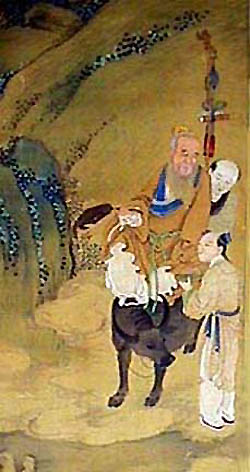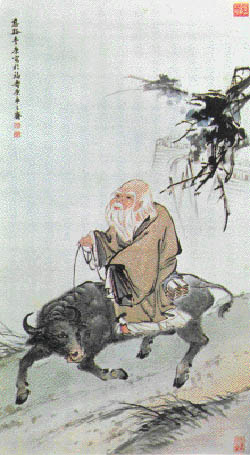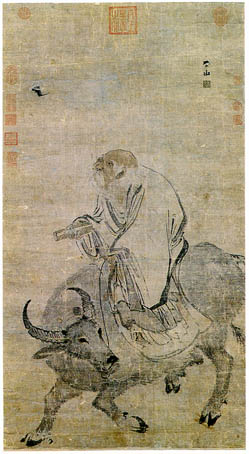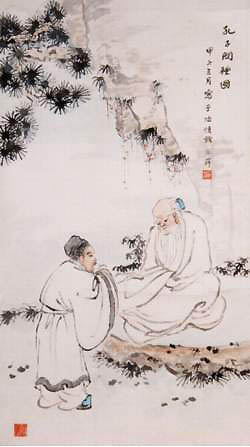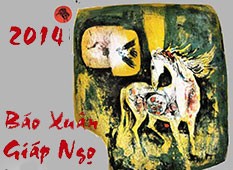LEGENDE
VON DER ENTSTEHUNG DES BUCHES TAO TE
KING
AUF DEM WEG DES LAOTSE IN DIE EMIGRATION
|
Legend
of the origin of the book
tao-te-ching on
lao-tsu's road into exile
|
|
1
Als er Siebzig war und war gebrechlich
Drängte es den Lehrer doch nach Ruh
Denn die Güte war im Lande wieder einmal schwächlich
Und die Bosheit nahm an Kräften wieder einmal zu.
Und er gürtete die Schuh.
|
1
once he was seventy and getting brittle
quiet retirement seemed the teacher's due.
in his country goodness had been weakening a little
and the wickedness was gaining ground anew.
so he buckled on his shoe.
|
|
2
Und er packte ein, was er so brauchte:
Wenig. Doch es wurde dies und das.
So die Pfeife, die er abends immer rauchte
Und das Büchlein, das er immer las.
Weißbrot nach dem Augenmaß.
|
2
and he packed up what he would be needing:
not much. but enough to travel light.
items like the book that he was always reading
and the pipe he used to smoke at night.
bread as much as he thought right.
|
|
3
Freute sich des Tals noch einmal und vergaß es
Als er ins Gebirg den Weg einschlug
Und sein Ochse freute sich des frischen Grases
Kauend, während er den Alten trug.
Denn dem ging es schnell genug.
|
3
gladly looked back at his valley, then forgot it
as he turned to take the mountain track.
and the ox was glad of the fresh grass it spotted
munching, with the old man on its back
happy that the pace was slack.
|
|
4
Doch am vierten Tag im Felsgesteine
Hat ein Zöllner ihm den Weg verwehrt:
"Kostbarkeiten zu verzollen?" - "Keine."
Und der Knabe, der den Ochsen führte, sprach: "Er hat gelehrt."
Und so war auch das erklärt.
|
4
four days out among the rocks, a barrier
where a customs man made them report.
`what valuables have you to declare there?'
and the boy leading the ox explained: `the old man taught'.
nothing at all, in short.
|
|
5
Doch der Mann in einer heitren Regung
Fragte noch: "Hat er was rausgekriegt?"
Sprach der Knabe: "Daß das weiche Wasser in Bewegung
Mit der Zeit den harten Stein besiegt.
Du verstehst, das Harte unterliegt."
|
5
then the man, in cheerful disposition
asked again: `how did he make out, pray?'
said the boy: `he learnt how quite soft water, by attrition
over the years will grind strong rocks away.
in other words, that hardness must lose the day.'
|
|
6
Daß er nicht das letzte Tageslicht verlöre
Trieb der Knabe nun den Ochsen an
Und die drei verschwanden schon um eine schwarze Föhre
Da kam plötzlich Fahrt in unsern Mann
Und er schrie: "He, du! Halt an!
|
6
then the boy tugged at the ox to get it started
anxious to move on, for it was late.
but as they disappeared behind a fir tree which they skirted
something suddenly began to agitate
the man, who shouted: `hey, you! wait!'
|
|
7
Was ist das mit diesem Wasser, Alter?"
Hielt der Alte: "Interessiert es dich?
Sprach der Mann: "Ich bin nur Zollverwalter
Doch wer wen besiegt, das interessiert auch mich.
Wenn du's weißt, dann sprich!
|
7
`what was that you said about the water?'
old man pauses: `do you want to know?'
man replies: `i'm not at all important
who wins or loses interests, though.
if you've found out, say so.
|
|
8
Schreib mir's auf! Diktier es diesem Kinde!
So was nimmt man doch nicht mit sich fort.
Da gibt's doch Papier bei uns und Tinte
Und ein Nachtmahl gibt es auch: ich wohne dort.
Nun, ist das ein Wort?"
|
8
`write it down. dictate it to your boy there.
once you've gone, who can we find out from?
there are pen and ink for your employ here
and a supper we can share; this is my home.
it's a bargain: come!'
|
|
9
Über seine Schulter sah der Alte
Auf den Mann: Flickjoppe. Keine Schuh.
Und die Stirne eine einzige Falte.
Ach, kein Sieger trat da auf ihn zu.
Und er murmelte: "Auch du?"
|
9
turning round, the old man looks in sorrow
at the man. worn tunic. got no shoes.
and his forehead just a single furrow.
ah, no winner this he's talking to.
and he softly says: `You too?'
|
|
10
Eine höfliche Bitte abzuschlagen
War der Alte, wie es schien, zu alt.
Denn er sagte laut: "Die etwas fragen
Die verdienen Antwort." Sprach der Knabe: "Es wird auch schon kalt."
"Gut, ein kleiner Aufenthalt."
|
10
snubbing of politely put suggestions
seems to be unheard of by the old.
for the old man said: `those who ask questions
deserver answers'. then the boy; `what's more, it's turning cold.
`right. then get my bed unrolled.'
|
|
11
Und von seinem Ochsen stieg der Weise
Sieben Tage schrieben sie zu zweit
Und der Zöllner brachte Essen (und er fluchte nur noch leise
Mit den Schmugglern in der ganzen Zeit).
Und dann war's soweit.
|
11
stiffly from his ox the sage dismounted.
seven days he wrote there with his friend.
and the man brought them their meals (and all the smugglers were
astounded
at what seemed this sudden lenient trend).
and then came the end.
|
|
12
Und dem Zöllner händigte der Knabe
Eines Morgens einundachtzig Sprüche ein.
Und mit Dank für eine kleine Reisegabe
Bogen sie um jene Föhre ins Gestein.
Sagt jetzt: kann man höflicher sein?
|
12
and the boy handed over what they'd written -
eighty-one sayings - early one day.
and they thanked the man for the alms he'd given
went round that fir and climbed the rocky way.
who was so polite as they?
|
|
13
Aber rühmen wir nicht nur den Weisen
Dessen Name auf dem Buche prangt!
Denn man muß dem Weisen seine Weisheit erst entreißen.
Darum sei der Zöllner auch bedankt:
Er hat sie ihm abverlangt.
|
13
but the honor should not be restricted
to the saye whose name is clearly writ.
for a wise man's wisdom needs to be extracted.
so the customs man deserves his bit.
it was he who called for it.
|
